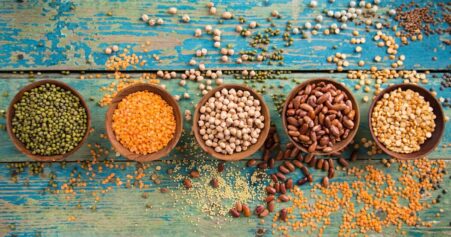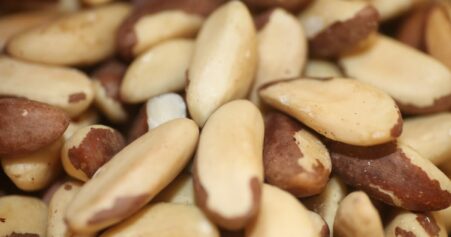Table of Contents
Iodine is one of the potentially critical nutrients in a vegan diet. Therefore, this article will focus on its functions, how common a deficiency is in a vegan and omnivorous diets, and what you can do to get enough of it.
Iodine is considered a major deficiency nutrient primarily worldwide and especially in developing countries. Iodine deficiency is most common in populations with increased needs, including pregnant women, lactating mothers, and young children. With the introduction of iodized table salt as an important health prophylaxis in some countries, iodine deficiency was significantly reduced.
Functions
Iodine is an essential trace element for the body, which means that it cannot produce the substance itself and is dependent on dietary intake. In the body, iodine serves as an essential component of thyroid hormones. These include both the active form, T3 or “triiodothyronine”, and the storage form, T4 or “tetraiodothyronine” or “thyroxine”, which are important for regulating metabolic processes. These hormones are involved in the growth and differentiation of cells and tissues, and in the development of the brain and bones. The presence of T3 is needed for energy metabolism, with the hormone intervening in the conversion of the three macronutrients (carbohydrates, fats, proteins) into energy in the form of ATP. Thus, daily energy expenditure at absolute rest, known as the basal metabolic rate, is influenced by the iodine-dependent thyroid hormone T3.
In order for T3 to be activated from its precursor, the storage form T4, an adequate supply of selenium is important, as a selenium-dependent enzyme is required for the conversion process.
Bioavailability
Iodine in foods is of inorganic form and is called iodide. Other factors in food do hardly interact with iodide, which is why it is almost completely absorbed in the small intestine. Iodized table salt contains the much more stable form, iodate, which is converted to iodide in the body before being absorbed into the bloodstream. This process takes place in a very short time, making iodized salt an adequate source of iodine.
 Theoretical inhibitors of iodine uptake are the so-called glucosinolates, a group of secondary plant substances, or the thiocyanates enzymatically split off from them. These substances are known for their pungent taste and are found in various cruciferous vegetables, such as cabbage, kohlrabi, horseradish and mustard. However, the “strumigenic” effect of glucosinolates from whole food sources, i.e., iodine deficiency and resulting thyroid enlargement (goiter or struma), could not be confirmed (Leung et al., 2011). Soy products have also long been suspected (based primarily on in vitro and animal studies) of being associated with the development or exacerbation of pre-existing hypothyroidism. Howeer, this has also not been confirmed (Messina and Redmond, 2006).
Theoretical inhibitors of iodine uptake are the so-called glucosinolates, a group of secondary plant substances, or the thiocyanates enzymatically split off from them. These substances are known for their pungent taste and are found in various cruciferous vegetables, such as cabbage, kohlrabi, horseradish and mustard. However, the “strumigenic” effect of glucosinolates from whole food sources, i.e., iodine deficiency and resulting thyroid enlargement (goiter or struma), could not be confirmed (Leung et al., 2011). Soy products have also long been suspected (based primarily on in vitro and animal studies) of being associated with the development or exacerbation of pre-existing hypothyroidism. Howeer, this has also not been confirmed (Messina and Redmond, 2006).
Other factors that affect the bioavailability of iodine include the hardness of drinking water and its nitrate content. These can also reduce the absorption capacity of iodine in the intestines.
The iodine content of foods varies greatly from place to place, depending on the iodine content of the soil and water and the conditions during production (further processing, fertilization, content in animal feed). In most European countries, soils and conditions are generally low in iodine, but there is a north-south gradient due to the proximity of the sea in the north (BfR, 2004).
Needs and Status
Individual iodine requirements depend to a small extent on dietary intake and can adapt to it. The reference value of the nutritional societies is an estimated value with a large enough safety margin to meet the needs of the average population. According to the DGE (2016), this is 200 µg iodine/day for adolescents and adults (15-50 years) and increases to 230 µg and 260 µg iodine/day during pregnancy and lactation.
To assess individual iodine status, a 24-hour iodine excretion test is recommended. This measures urinary iodine excretion over a full day, with concentrations between 100 and 199 µg iodine/liter providing an indication of optimal status (WHO, 2013).
Deficiency
 Deficiency of the essential trace element iodine is one of the world’s major health problems (WHO, 2004), although a positive trend has been observed, largely because of the industrial use of iodized table salt (Andersson et al., 2012). Iodine is also added to the feed of farm animals, which has increased the iodine content of milk and dairy products (BfR, 2012).
Deficiency of the essential trace element iodine is one of the world’s major health problems (WHO, 2004), although a positive trend has been observed, largely because of the industrial use of iodized table salt (Andersson et al., 2012). Iodine is also added to the feed of farm animals, which has increased the iodine content of milk and dairy products (BfR, 2012).
One symptom of iodine deficiency is the insufficient production of thyroid hormones. If concentrations of T3 and T4 in the blood are too low, the production of the hormone TSH (thyroid stimulating hormone), which is responsible for the release of T3 or T4 from the thyroid gland, increases due to the body’s own regulatory cycle. The thyroid gland cannot respond adequately, is overstimulated, and responds with compensatory increased cell growth. The resulting enlargement of the thyroid gland is called a goiter.
In the long term, an insufficient supply of thyroid hormones leads to a decrease in the basal metabolic rate, and may be the cause of hypothyroidism (underactive thyroid). The symptoms of hypothyroidism are very characteristic and include constant weight gain, delayed digestion with constipation, increased sensitivity to cold, dry skin, slow reflexes and poor concentration.
If a woman’s iodine intake is inadequate during pregnancy, the child may experience significant growth and developmental impairments, resulting in underperforming organs. The brain and central nervous system are particularly affected, and the condition is known as cretinism.
Occurence
The iodine content of food depends on regional soil conditions. Seas, lakes, and oceans provide higher iodine concentrations than continental soils. However, iodized table salt with a content of 15 to 25 mg iodine/kg salt is an additional source, which is why its use is not only recommended for private households, but also for industrial and gastronomic purposes as well as in communal catering. This is why processed products, such as bread, contain a certain amount of iodine. A daily intake of 5 g of iodized salt, which is the equivalent of a teaspoonful, will provide a significant proportion of the daily requirement of 75 to 125 µg of iodine (depending on the iodie content of salt in your country).

Since salt consumption in our population is generally considered to be too high, with the WHO recommending no more than 5 g per day, it is important to also use other sources of iodine. Algae are a good option, although their iodine content varies greatly depending on the species (5,000-11,000 mg/kg). Nori algae, such as those used in Japanese cuisine to prepare sushi, have an iodine content of between 4 and 60 mg/kg. Therefore, they can be included in the diet as an additional source. Regular consumption of algae with a much higher iodine content is not recommended or should be limited because due to the high bioavailability of iodine, excessive intake can lead to thyroid disorders, known as hyperthyroidism. These types of algae include arame, kombu, and wakame. In particular, young children, pregnant women and the elderly are considered to be population groups with significantly higher sensitivity to the high iodine concentrations (AGES, 2010).
Other plant foods which contain low amounts of iodine include mushrooms, broccoli, peanuts, spinach, pumpkin seeds, and cashews.
Table 1: Iodine Content of Plant Foods (Leitzmann and Keller, 2013; BLS)
| Food | Iodine | Amount to Meet the Daily Requirment |
|---|---|---|
| (µg/100 g) | gram of food | |
| kombu (Laminaria japonica) |
170,000–420,800 | ~ 0.1 |
| arame (Eisenia bicyclis) |
300,000–564,000 | ~ 0.2 |
| wakame (Undaria pinnatifida) |
10,400–35,000 | ~ 2 |
| hijiki (Hizikia fusiforme) |
9,500–43,000 | ~ 2.1 |
| nori (Porphyra tenera) |
430–6,000 | 50 |
| sea salt | 2,000 | 10 |
| iodized table salt | 1,500–2,500 | 8 |
| spirulina, powder | 461 | 43 |
| red algae, dried | 317 | 63 |
| brown algae, dried | 307 | 65 |
| mushrooms, dried | 201 | 100 |
| shiitake mushroom, dried | 53 | 377 |
| lamb’s lettuce | 35 | 571 |
| porcino, dried | 27.4 | 730 |
| mushromms, raw | 18 | 1,111 |
| broccoli | 15 | 1,333 |
| peanuts | 13 | 1,538 |
| spinach | 12 | 1,667 |
| pumpkin seeds | 12 | 1,667 |
| cashew nuts | 10 | 2,000 |
| watermelon | 10 | 2,000 |
Iodine Status on a Vegan Diet
Vegans are considered to be at risk for iodine deficiency. The effects of subclinical deficiency are still under investigation (Leitzmann et al., 2013; Leung et al., 2011). Compared to vegetarians, who get iodine through milk and dairy products, iodine excretion of vegans was below the optimal status in a European study (Krajcovicová-Kudlácková et al., 2003). In a vegan diet, attention should be paid to adequate intake from the sources mentioned above, and the use of iodized table salt is recommended.
Conclusion
The trace element iodine, which is essential for thyroid gland and metabolic processes, is one of the world’s most important deficient nutrients. Developing countries are particularly affected, but people with increased needs and populations in areas with iodine-deficient soils are also affected, regardless of their dietary patterns. Scientific evidence suggests that vegans are a potential risk group for iodine deficiency due to their limited food choices. Therefore, it is recommended to pay attention to specific sources of iodine when following a vegan diet. The use of iodized salt makes a significant contribution to iodine intake, and the inclusion of seaweed (for example nori) in the diet is another option. Fruit and vegetables grown on iodine-deficient soils only contain small amounts of iodine.
Supplements can be used in when an iodine deficiency has been diagnosed. However, care should be taken with the dose, as the trace element is almost completely absorbed and oversupply can lead to thyroid disorders (Leitzmann et al., 2013). Kelp tablets or potassium iodide can be used to supplement iodine intake and meet daily iodine requirements.









Leave a Reply